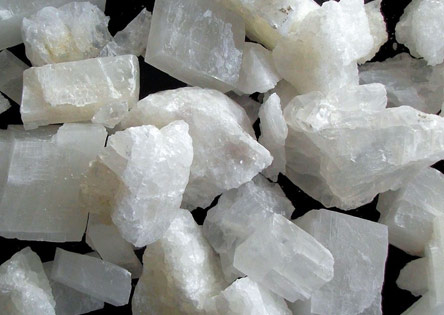Calcite
Calcite is a calcium carbonate mineral (minerals containing CO3) that is usually white. It is one of the most important minerals in the world and is extremely common. It can be found in the three main types of rocks (sedimentary, metamorphic and igneous rocks) and, in the form of marble or limestone, makes up much of the Earths crust. Calcite is one of the main minerals in limestone, marble and shells of marine species. Interestingly, calcite has more practical uses than most other minerals in the world. It has the same chemical formula as other types of calcium carbonate, such as limestone, marble and chalk: CaCO3. It comes in bright white color and it has nodular particle size with strong crystal structure.
The common features are as follows:-
- Rapid and complete dispersion
- Very Low abrassion at high loading
- Very low moisture content
- Good compatibility with polymers and other additives
- Better impact strength of polymer compound as compared to uncoated material
APPLICATIONS:-
- As a formation bridging and filter-cake sealing agent in drilling fluids.
- As a weighting material to increase the density of drilling fluids, to control downhole pressures.
- As an extender in paints, especially in matte emulsion paints.
- As a filler in plastics (example - 15 to 20% loading of chalk in PVC drain pipe) as well as thermosetting resins.
- In a wide range of trade and DIY adhesives, sealants, and decorating fillers.
- In setting stained glass windows, along with putty.
- As a resist to prevent glass from sticking to kiln shelves when firing glazes and paints at high temperature.
- As a common ingredient for many glazes, in ceramics/glazing applications.
- In the production of glossy paper, replacing kaolin.
- For the purpose of purifying iron steel materials, in a blast furnace, from iron ore.
- As a building material in its own right (like marble) or limestone aggregate for the purpose of road-building and construction.
- For making mortar, which is used in bonding bricks, concrete blocks, stones and tiles.
- As a filler material for latex gloves, as precipitated Calcium carbonate (pre-dispersed in slurry form).
- As a major component of blackboard chalk.
- As an inert filler for tablets and other pharmaceuticals.
- As a pH corrector in swimming pools, for maintaining alkalinity buffer to offset the acidic properties of the disinfectant agent.
- In the production of toothpaste.
- Environmental uses.
Note:- Specifications and chemical analysis can be furnished only when we get to know the grades/applications desired by you.
View Our Latest Test Report
